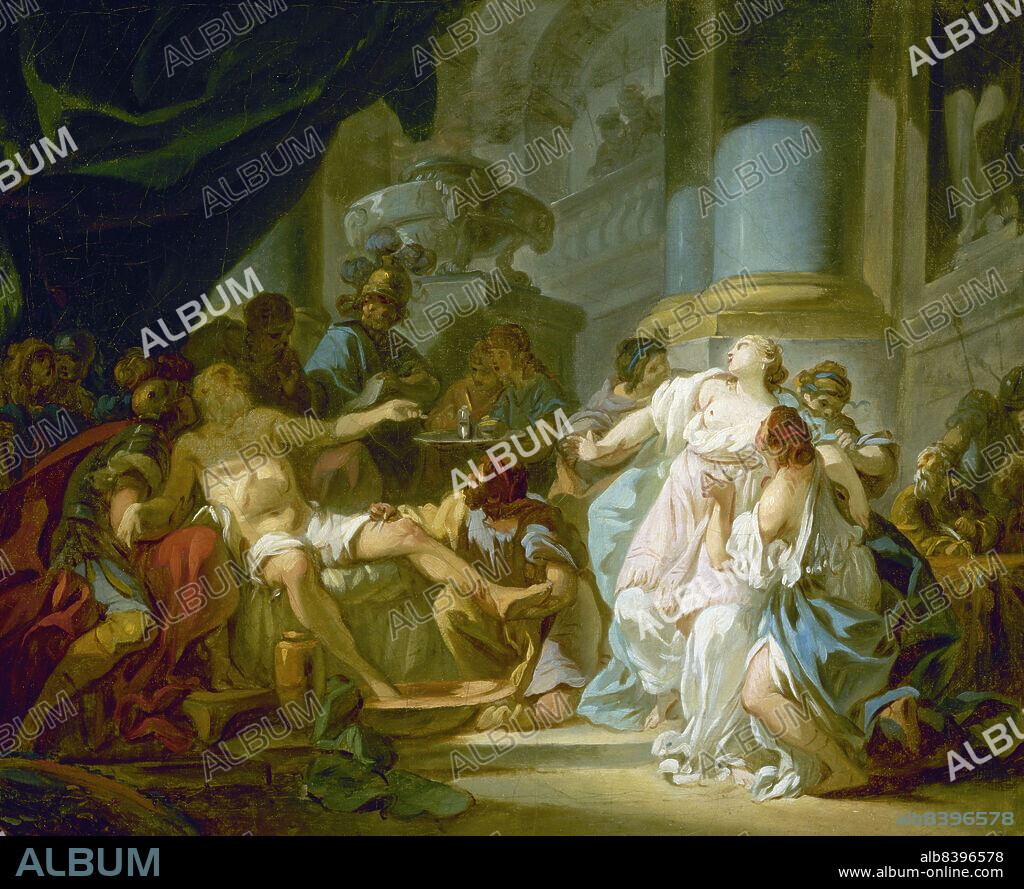alb8396578
JACQUES LOUIS DAVID. La Mort de Sénèque,1773. Creator: Jacques-Louis David.

|
Add to another lightbox |
|
Add to another lightbox |



Buy this image.
Select the use:

Author:
Title:
La Mort de Sénèque,1773. Creator: Jacques-Louis David.
Caption:
La Mort de Sénèque, 1773. The Death of Seneca. The Roman philosopher Seneca, accused of having participated in a conspiracy against the Emperor Nero, was ordered to commit suicide. Seneca accepts the sentence and his wife, Pompeia Paulina, chooses to die with him. The spouses open their veins, but death is slow to come. Seneca then asks the servants to keep his wife away to prevent one from weakening at the sight of the sufferings of the other. A doctor cuts the philosopher's ankles so that the blood flows faster into a basin placed at his feet, and a slave presents a vial of poison on a plate. In the background, a centurion dispatched by Nero ensures the execution of the sentence. On the right, a disciple notes the last words of the Stoic philosopher, who gives, through his death, an example of the highest moral virtues in the face of tyranny. Pompeia will survive, spared by the emperor.
Personalities:
Credit:
Album / Heritage Art/Heritage Images
Releases:
Image size:
4189 x 3421 px | 41.0 MB
Print size:
35.5 x 29.0 cm | 14.0 x 11.4 in (300 dpi)
Keywords:
18TH CENTURY • 18TH CENTURY, THE • 18TH CENTURY. • 18TH • ANCIENT ROMAN • ANCIENT ROME • BLEEDING • BLOOD • CANVAS (MATERIAL) • CENTURY • COLOR • COLOUR • COMMITTING SUICIDE • CONCEPT • COUNTRY • DAVID L • DAVID LOUIS • DAVID • DAVID, JACQUES LOUIS • DEATH SENTENCE • DEATH • DRAMATIC • DYING • EIGHTEENTH CENTURY • FEMALE • FLUSH • FRANCE • FRENCH • GUY • HEMMORHAGE • HEMORRHAGE • HEMORRHAGED • HEMORRHAGING • HUSBAND • INSTITUTION • ISRAEL • ITALIA • ITALY • JACQUES LOUIS DAVID • JACQUES LOUIS • JACQUES-LOUIS DAVID • JACQUES-LOUIS • LAW • LOCATION • LUCIUS ANNAEUS SENECA • LUCIUS ANNAEUS • MALE • MAN • MARRIAGE • MEN • MUSEUM • OIL PAINT • OIL PAINTING • OIL PAINTINGC PIO DI SAVOIA • OLI PAINTING • PAINTING • PARIS MUSEUMS • PAULINA • PEOPLE • PETIT PALAIS • PHILOSOPHER • PHILOSOPHY • PICTURE • POMPEIA PAULINA • POMPEIA • ROMAN • ROMANS • ROME • SANGUINE • SENECA THE YOUNGER • SENECA • STOA • STOIC • STOICISM • SUFFERING • SUICIDE • WIFE • WIVES • WOMAN • WOMEN • XVIII CENTURY


 Pinterest
Pinterest Twitter
Twitter Facebook
Facebook Copy link
Copy link Email
Email
